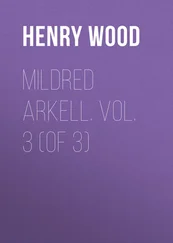Henry Wood - The Shadow of Ashlydyat
Здесь есть возможность читать онлайн «Henry Wood - The Shadow of Ashlydyat» — ознакомительный отрывок электронной книги совершенно бесплатно, а после прочтения отрывка купить полную версию. В некоторых случаях можно слушать аудио, скачать через торрент в формате fb2 и присутствует краткое содержание. Жанр: foreign_prose, literature_19, foreign_antique, на английском языке. Описание произведения, (предисловие) а так же отзывы посетителей доступны на портале библиотеки ЛибКат.
- Название:The Shadow of Ashlydyat
- Автор:
- Жанр:
- Год:неизвестен
- ISBN:нет данных
- Рейтинг книги:4 / 5. Голосов: 1
-
Избранное:Добавить в избранное
- Отзывы:
-
Ваша оценка:
- 80
- 1
- 2
- 3
- 4
- 5
The Shadow of Ashlydyat: краткое содержание, описание и аннотация
Предлагаем к чтению аннотацию, описание, краткое содержание или предисловие (зависит от того, что написал сам автор книги «The Shadow of Ashlydyat»). Если вы не нашли необходимую информацию о книге — напишите в комментариях, мы постараемся отыскать её.
The Shadow of Ashlydyat — читать онлайн ознакомительный отрывок
Ниже представлен текст книги, разбитый по страницам. Система сохранения места последней прочитанной страницы, позволяет с удобством читать онлайн бесплатно книгу «The Shadow of Ashlydyat», без необходимости каждый раз заново искать на чём Вы остановились. Поставьте закладку, и сможете в любой момент перейти на страницу, на которой закончили чтение.
Интервал:
Закладка:
“I wondered why Margery came to Scotland,” observed Charlotte, “not being Lady Godolphin’s maid. What is Margery’s capacity in your family? I have never been able to find out.”
“It might puzzle herself to tell you what it is, now. After my mother’s death, she waited on my sisters: but when they left Ashlydyat, Margery declined to follow them. She would not leave Sir George. She is excessively attached to him, almost as much so as she was to my mother. That quitting Ashlydyat, ourselves first, and then my father, was a blow to Margery,” George added in a dreamy tone. “She has never been the same since.”
“It was Margery, was it not, who attended upon Sir George in his long illness?”
“I do not know what he would have done without her,” spoke George Godolphin in a tone that betrayed its own gratitude. “In sickness she is invaluable: certainly not to be replaced, where she is attached. Lady Godolphin, though in her heart I do not fancy she likes Margery, respects her for her worth.”
“I cannot say I like her,” said Charlotte Pain. “Her manners are too independent. I have heard her order you about very cavalierly.”
“And you will hear her again,” said George Godolphin. “She exercised great authority over us when we were children, and she looks upon us as children still. Her years have grown with ours, and there is always the same distance as to age between us. I speak of the younger amongst us: to Thomas and Janet she is ever the respectful servant; in a measure also to Bessy: of myself and Cecil she considers herself partial mistress.”
“If they are so poor as to drain Margery of her money, how is it they can live in that house and pay its rent?” inquired Charlotte, looking towards the building.
“It is Bray’s own. The land, belonging to it, has been mortgaged three deep long ago. He might have been in a tolerably good position, had he chosen to make the most of his chances: he was not born a peasant.”
“Who is this?” exclaimed Charlotte.
A tall, slouching man, with red hair and heavy shoulders, was advancing towards them from the house. George turned to look.
“That is Bray himself. Look at the lazy fellow! You may tell his temperament from his gait.”
George Godolphin was right. The man was not walking along, but sauntering; turning to either side and bending his head as if flowers lay in his path and he wished to look at them: his hands in his pockets, his appearance anything but fresh and neat. They watched him come up. He touched his hat then, and accosted Mr. George Godolphin.
“My service to ye, sir. I didna know you were in these parts.”
“So you are still in the land of the living, Bray!” was Mr. George’s response. “How is business?”
“Dull as a dyke,” returned Bray. “Times are bad. I’ve hardly took a crown in the last three months, sir. I shall have to emigrate, if this is to go on.”
“I fear you would scarcely find another country so tolerant to your peculiar calling, Bray,” said George, some mockery in his tone. “And what would the neighbourhood do without you? It must resign itself to single blessedness.”
“The neighbourhood dunna come to me. Folk go over to the kirk now: that has come into fashion; and I’m going down. ’Twas different in past times. A man would give a ten-pun note then to have things done neatly and quietly. But there’s fresh notions and fresh havers; and, for all the good they have done me, I might as well be out of the world. Is this Miss Cecil?”
The last question was put abruptly, the man turning himself full upon Charlotte Pain, and scanning her face. George Godolphin was surprised out of an answer: had he taken a moment for reflection, he might have deemed the question an impertinence, and passed it by.
“Miss Cecilia is not in Scotland.”
“I thought it might be her,” said the man; “for Miss Cecil’s looks are a country’s talk, and I have heard much of them. I see now; there’s nought of the Godolphin there . But it’s a bonny face, young lady: and I dare say there’s those that are finding it so.”
He shambled on, with a gesture of the hand by way of salutation. Charlotte Pain did not dislike the implied compliment. “How can this man marry people?” she exclaimed. “He is no priest.”
“He can, and he does marry them; and is not interfered with, or forbidden,” said George Godolphin. “At least, he did do so. By his own account, his patronage seems to be on the decline.”
“Did he marry them openly?”
“Well—no; I conclude not. If people found it convenient to marry openly, they would not go to him. And why they should go to him at all, puzzles me, and always has: for, the sort of marriage that he performs can be performed by any one wearing a coat, in Scotland, or by the couple themselves. But he has acquired a name, ‘Minister Bray;’ and a great deal lies in a name for ladies’ ears.”
“Ladies!” cried Charlotte scornfully. “Only the peasants went to him, I am sure.”
“Others have gone as well as peasants. Bray boasts yet of a fifty-pound note, once put into his hand for pronouncing the benediction. It is a ceremony that we are given to be lavish upon,” added George, laughing. “I have heard of money being grudged for a funeral, but I never did for a wedding.”
“Were I compelled to be a resident of this place, I should get married myself, out of sheer ennui, or do something else as desperate,” she exclaimed.
“You find it dull?”
“It has been more tolerable since you came,” she frankly avowed.
George raised his hat, and his blue eyes shot a glance into hers. “Thank you, Charlotte.”
“Why were you so long in coming? Do you know what I had done? I had written a letter to desire Mrs. Verrall to recall me. Another week of it would have turned me melancholy. Your advent was better than nobody’s.”
“Thank you again, mademoiselle. When I promise–”
“Promise,” she warmly interrupted. “I have learnt what your promises are worth. Oh, but, George, tell me—What was it that you and Lady Godolphin were saying yesterday? It was about Ethel Grame. I only caught a word here and there.”
“Thomas wishes Lady Godolphin would invite Ethel here for the remainder of their stay. He thinks Ethel would be all the better for a change, after being mured up in that fever-tainted house. But, don’t talk of it. It was only a little private negotiation that Thomas was endeavouring to carry out upon his own account. He wrote to me, and he wrote to my lady. Ethel knows nothing of it.”
“And what does Lady Godolphin say?”
George drew in his lips. “She says No. As I expected. And I believe she is for once sorry to say it, for pretty Ethel is a favourite of hers. But she retains her dread of the fever. Her argument is, that, although Ethel has escaped it in her own person, she might possibly bring it here in her boxes.”
“Stuff!” cried Charlotte Pain. “Sarah Anne might do so; but I do not see how Ethel could. I wonder Thomas does not marry, and have done with it! He is old enough.”
“And Ethel young enough. It will not be delayed long now. The vexatious question, concerning residence, must be settled in some way.”
“What residence? What is vexatious about it?” quickly asked Charlotte, curiously.
“There is some vexation about it, in some way or other,” returned George with indifference, not choosing to speak more openly. “It is not my affair; it lies between Thomas and Sir George. When Thomas comes here next week–”
“Is Thomas coming next week?” she interrupted.
“That is the present plan. And I return.”
She threw her flashing eyes at him. They said—well, they said a good deal: perhaps Mr. George could read it. “You had better get another letter of recall written, Charlotte,” he resumed in a tone which might be taken for jest or earnest, “and give me the honour of your escort.”
Читать дальшеИнтервал:
Закладка:
Похожие книги на «The Shadow of Ashlydyat»
Представляем Вашему вниманию похожие книги на «The Shadow of Ashlydyat» списком для выбора. Мы отобрали схожую по названию и смыслу литературу в надежде предоставить читателям больше вариантов отыскать новые, интересные, ещё непрочитанные произведения.
Обсуждение, отзывы о книге «The Shadow of Ashlydyat» и просто собственные мнения читателей. Оставьте ваши комментарии, напишите, что Вы думаете о произведении, его смысле или главных героях. Укажите что конкретно понравилось, а что нет, и почему Вы так считаете.












